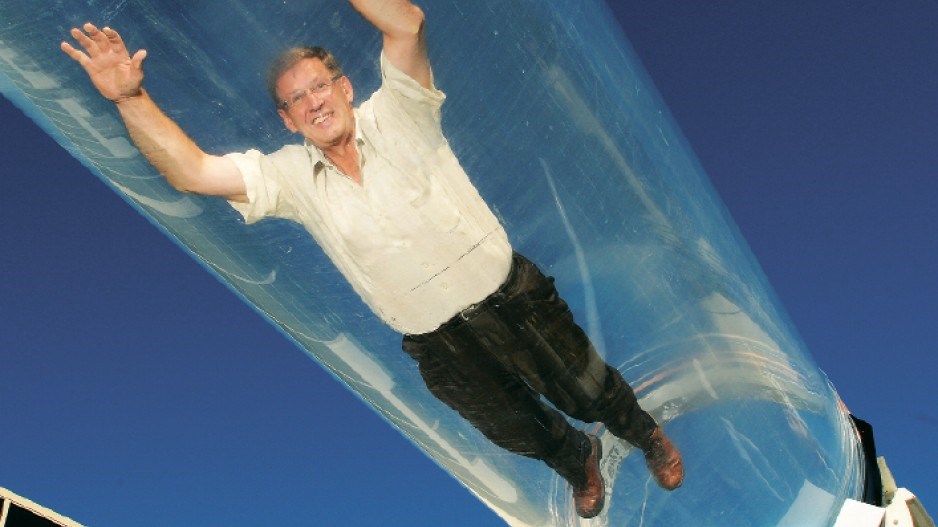If you and your children have played on a waterslide while on vacation virtually anywhere in the world, chances are good the slide was made in B.C. by WhiteWater West Industries Ltd.
And if you play a Fender acoustic guitar, the soundboard (the guitar top) was also likely made here in B.C., by Teal Jones Group.
Overshadowed by forestry, mining, technology and oil and gas, manufacturing is one of those sectors of the economy that tend to fly under the radar in B.C. It’s not even on the list of eight key industries identified in the BC Jobs Plan. Yet when it comes to providing jobs, manufacturing is the fourth-largest employer in B.C., providing 163,500 jobs, according to BC Stats.
Compared with Ontario, however, manufacturing remains a minor player in B.C.
“Probably 80% of our GDP is resource-based, and only 10% is manufacturing,” said Kevin Davis, director of memberships for the B.C. branch of the Canadian Manufacturers and Exporters (CME). “If you go to Ontario, it’s the total opposite. You’ve got the automotive business, steel plants, food processing.”
Given a high-tech sector that is constantly coming up with new technologies, and given its access to ports, it is surprising that B.C. doesn’t do more manufacturing.
As Corvus Energy COO Neil Lang points out, the challenge for any B.C. manufacturer is “how to serve a global market effectively from a small corner of Canada.”
Corvus is one of B.C.’s recent success stories, both as a technology company and a manufacturer. It specializes in building large lithium-ion batteries for industrial applications, such as ships and backup power.
Founded in 2009, Corvus now employs 60 people in Richmond and is on target to hit $25 million in sales for the fiscal year ending in April. That’s up from $6 million the previous year.
One of the biggest markets for the company’s batteries is Europe, which presents a strategic problem for Corvus, located as it is on the West Coast. It can take six weeks to ship product by rail to the East Coast and then by container ship to Europe.
In the early stages of the company, it made sense to be located in Vancouver, because that’s where a lot of the engineering talent is. But as markets expand in places like Europe, Lang said it makes sense to push manufacturing closer to those markets, although he added that, even if that happens, the more highly skilled engineering jobs would remain in B.C.
“For North America, Vancouver is still a great location. California’s one of the biggest markets. But for Asia and for Europe, you kind of want to move the manufacturing.It’s no longer about pushing it to low-cost, low-labour manufacturers. I think that is kind of disappearing. It’s more about going to your customer.”
Although Vancouver’s high-tech sector has the potential to drive new manufacturing opportunities in B.C., forestry remains the cornerstone for about a fifth of the manufacturing done in the province. Whether it’s lumber, musical instruments or pulp and paper, about 20% of the manufacturing done in B.C. is wood-based, according to the CME. Companies like Teal Jones have built a successful business doing value-added manufacturing with wood.
The Surrey-based integrated forest company employs 1,100 people, who make everything from lumber and cedar shakes to acoustic guitar tops for some of the world’s biggest guitar makers, including Fender.
Its biggest challenge, ironically, is getting access to logs. One of the company’s plants currently runs two shifts. It could be running three, if it could get the logs it needs, said John Burch, Teal Jones’ vice-president of sales and marketing.
“Today our sales are good, and if we weren’t constrained by log supply we would be running around the clock, seven days a week at all our operations.”
Although the increased export of raw logs from B.C. isn’t the only thing constraining the log supply, Burch said “it’s a contributing factor.”
For other Lower Mainland manufacturers, the biggest obstacle to stability and growth is municipal taxes and access to skilled labour. Whereas many technology companies in B.C. are thriving, thanks to a favourable provincial business tax climate, manufacturers are vulnerable to big hikes in property taxes.
“Property tax has been a huge issue,” Davis said. “If you’ve got real estate in the Vancouver area, you got hit pretty hard. And it has been an issue for many of our manufacturers, and that’s why it’s an expensive jurisdiction to do business.
“There’s not a lot of inducements from the provincial government or the municipalities to expand your business or stay here.”
For those manufacturers that need welders, millwrights and machine operators, there is the added problem of hiring skilled tradespeople, many of whom are being lured to northern B.C. and Alberta by resource industries.
“Filling positions for tradespeople is getting increasingly difficult,” said WhiteWater manufacturing operations manager Bill Ahern.
The Richmond-based company builds about 120 waterslides per year for customers all over the world for water parks, resorts, amusement parks and cruise ships. The company employs 500 people – 250 in Richmond and another 250 in Kelowna at its Whitewater Composites Ltd. subsidiary.
Despite the challenges manufacturers face in B.C., there are some positive signs on the horizon, one of them being the recently concluded Comprehensive Economic and Trade Agreement (CETA).
Davis said the agreement could open up new markets in Europe for B.C.-made products. The CME recently set up a working group with the Enterprise Europe Network, with the plan of matching Canadian manufacturers with European customers. With a population of about 580 million, Europe is a substantial market.
“We think there’s opportunities in that market because the value premise is similar to the U.S. market,” Davis said. “And there’s good ties economically between Canada and the U.K. or Germany or France or Italy.”




